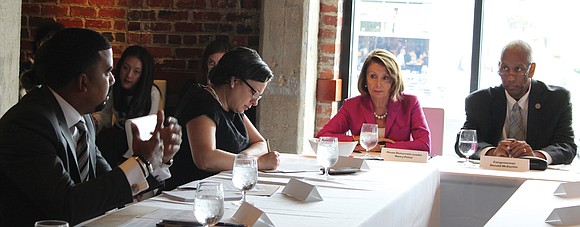African-American communities must factor into infrastructure upgrades, clean energy jobs
By Nia Tariq | 10/11/2018, 6 a.m.

Disadvantaged communities, including African-American enclaves, must be a central focus for any future legislation to upgrade the nation’s aged and deteriorating infrastructure, according to Gilbert G. Campbell III, co-founder and managing partner of Volt Energy, a minority-owned solar energy development firm based in Washington.
Mr. Campbell was among more than a dozen local leaders and representatives from national environmental organizations participating in a roundtable discussion on improving the nation’s infrastructure and cleaning up the environment. Most notably, House Minority Leader Nancy Pelosi of California attended the Oct. 5 event held at a Richmond riverfront restaurant and hosted by 4th District Congressman A. Donald McEachin.
Reps. McEachin and Pelosi led the conversation about the possibilities of future federal legislation and funding for infrastructure that Rep. McEachin said is in “dire need of modernization.”
“Updating our infrastructure — repairing failing roads, bridges and water systems, modernizing our buildings and electric grid and pivoting to clean energy sources like solar and wind — will make communities safer and healthier,” Rep. McEachin said.
Mr. Campbell and others urged that communities of color be a part of the solution.
“When we look at the communities that have been impacted the most with carbon emissions, it’s underserved communities,” Mr. Campbell said. “They’ve had the worst impacts of climate change. So when we’re talking about building new infrastructure, we have to make sure they’re at the forefront.”
State Sen. Jennifer L. McClellan of Richmond also placed special emphasis on underserved populations, particularly those living in low-income, public housing communities in the city.
“Making sure that we are looking at green infrastructure for housing is equally important as green infrastructure for our schools,” Sen. McClellan said. “We have a lot of public housing (in Richmond) that was built in the 1940s that is not weatherized, that has challenges. We want to make sure that any infrastructure bill does not overlook our housing needs as well.”
Rep. Pelosi said improving infrastructure and the environment are matters of national security, economics, health and morality and that Americans need to be “good stewards of God’s creation” for future generations.
The House minority leader also said the country needs a green infrastructure bill, otherwise the nation “might as well go back to the ’50s.”
She alluded to working closely with Rep. McEachin on a future climate-focused committee, similar to the House Select Committee on Energy Independence and Global Warming that she helped establish in 2007, but was discontinued in 2011 after Republicans regained control of Congress.
“When I was speaker, my flagship issue was climate and energy and the environment,” Rep. Pelosi said. “When we lost the majority, our colleagues eliminated that particular select committee, which — when we win — I hope to reinstate. And I will do so with the guidance and leadership of Congressman McEachin,” she said.
Mike Town, executive director of the Virginia League of Conservation Voters, urged the group to be mindful of losses coal miners in Virginia and elsewhere may face with the move toward cleaner energy.
“It’s one thing to leave the CEOs of the coal companies behind. It’s another to leave the workers of those companies behind,” Mr. Town said. “We have to take into account the impact on communities in Southwestern Virginia.”
Roxanne D. Brown, legislative director of the United Steelworkers, said some people who think green energy may jeopardize their livelihood could benefit from the new jobs it will create.
“Manufacturing jobs are often not thought about when it comes to infrastructure,” Ms. Brown said. “That’s steel, aluminum, cement, brick, glass, rubber — the list goes on and on. These are all various components that go into infrastructure projects. Those are jobs.”
Rep. Pelosi criticized the Trump administration for not doing a better job addressing global climate change and not providing the public a path to a cleaner energy future.
“We thought we would be working early with (President Trump) on the infrastructure bill — it never materialized,” she said. “Eighteen months later, he came up with a mini, $200 billion bill, and it was pathetically small,” she said.
Furthermore, she said instilling knowledge about the environment is crucial for the younger generation.
“Children know that they should be careful about overusing resources. And children in school know more than the president of the United States or the Congress on this issue,” she said. “We’ve seen it in inner-cities where many kids have learned how to do solar panels in their schools. They can be trained to do these jobs in their schools, reducing costs and improving education for them.”
Rep. McEachin said he hopes that next month’s election will put Democrats in a better position to make suggestions from the roundtable a reality.
“Hopefully we’ll get some traction in the 116th Congress,” he said. “We just need to make sure it’s a blue day in November.”






